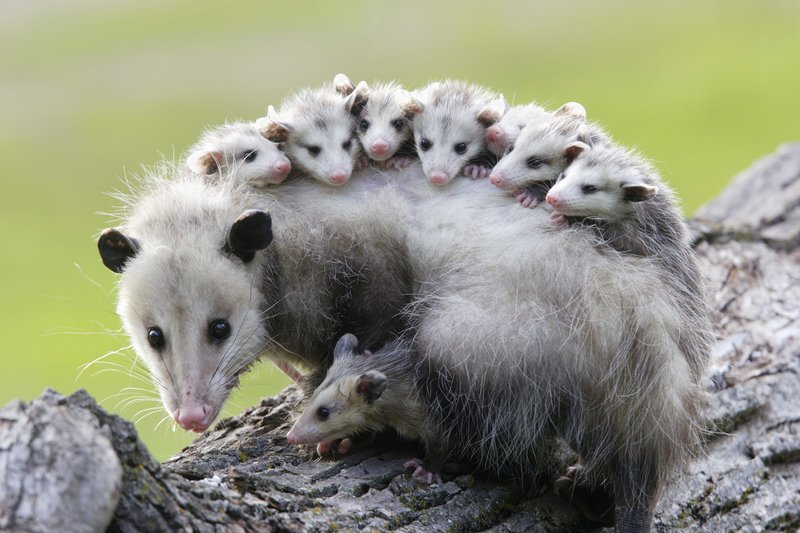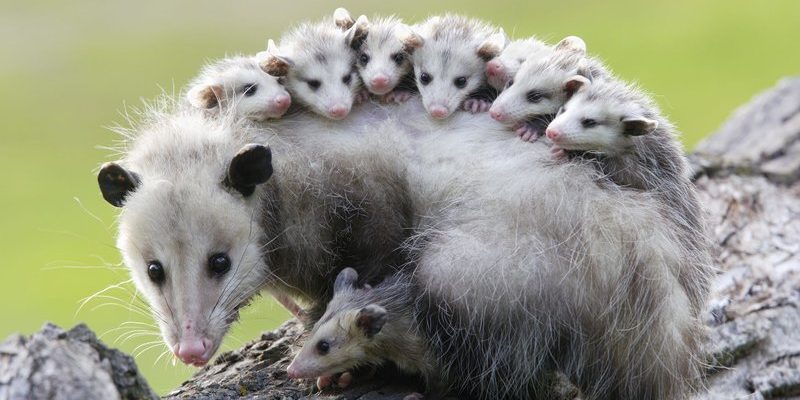
Opossums are often misunderstood. Many people view them as pests, but these furry friends are much more than that. They have a unique set of skills and behaviors that contribute significantly to their habitat. So, let’s dive into the fascinating world of opossums and explore the essential roles they play in our ecosystems.
What Are Opossums?
Opossums are marsupials, which means they carry their young in a pouch, similar to kangaroos. They’re the only marsupials found in North America. Most commonly, you’ll encounter the Virginia opossum, which is known for its adaptability to various environments. Physically, they’re characterized by their long snouts, prehensile tails, and distinctive white fur.
You might be wondering why they’re often seen at night. Opossums are nocturnal creatures, which means they’re most active during the night when they’re out searching for food. Their diet mainly consists of fruits, insects, and small animals, making them opportunistic feeders. This flexibility in diet helps them survive in diverse habitats, ranging from urban areas to forests.
Natural Cleaners: The Role of Opossums in Waste Reduction
Here’s the thing: opossums are excellent at keeping our environment clean. They’re nature’s garbage disposals, consuming leftovers and decaying matter that might otherwise create a mess. By munching on dead animals, they help prevent the spread of diseases that can come from rotting carcasses.
In other words, they’re like little recyclers. They feast on dead animals—think roadkill or other unfortunate casualties in nature. This scavenging prevents the buildup of waste and removes potential breeding grounds for pests like flies and bacteria.
Moreover, opossums help keep gardens tidy. They’ll snack on garden pests such as slugs, insects, and even small rodents. So, if you’re an avid gardener, having an opossum pass through your yard can be quite beneficial. They might just be the eco-friendly solution to your pest problems!
Pest Control: Opossums and Insect Management
You might be surprised to learn that opossums are also skilled pest controllers. They eat many insects, including ticks, which can carry diseases harmful to both humans and pets. In fact, studies suggest that a single opossum can eat thousands of ticks in a single season. That’s a lot of potential disease prevention right there!
Opossums have a unique advantage when it comes to ticks: their fur is dense, providing a barrier that ticks find difficult to attach to. As they munch on these pesky insects, they’re reducing their population significantly. So, if you ever spot an opossum in your yard, think of them as tiny tick-fighting superheroes.
Plus, by keeping insect populations in check, they help balance the food chain. This balance is crucial for maintaining healthy ecosystems. Without these little critters, pest populations could explode, leading to more significant problems for plants, animals, and even humans.
Opossums and Their Relationship with Other Wildlife
Opossums also play a pivotal role in their relationships with other wildlife. Think about it: they’re like the friendly neighbors of the animal kingdom. While they may not have a significant role higher up the food chain, their presence influences numerous species around them.
For example, when they eat carrion (that’s a fancy term for dead animals), they not only clean the environment but also provide a meal for scavengers like eagles, hawks, or even other smaller carnivores. It’s nature’s way of ensuring that everyone gets a chance to thrive.
Additionally, because opossums are a food source for larger predators, they contribute to the hunting practices of these animals. In this way, they support the balance of predator and prey in their habitats—each creature, big or small, has its importance.
The Opossum’s Unique Defense Mechanisms
You might think that being small and relatively defenseless makes opossums easy targets, but they have some clever tricks up their sleeves. Their most famous defense mechanism is *playing dead*. When threatened, an opossum can collapse and appear lifeless, which often confuses predators. This dramatic act can save their lives, allowing them to escape once the danger passes.
Besides playing dead, opossums also produce a foul-smelling fluid to deter predators. It’s a smelly but effective way to say, “Back off!” These strategies not only keep individual opossums safe but also ensure they can continue their vital roles in the ecosystem.
Their ability to adapt to various threats speaks to their importance in maintaining healthy populations within their habitats. Every time you spot an opossum, remember they’re not just surviving—they’re thriving and contributing to the ecosystem’s balance.
How Opossums Impact Plant Life
Opossums also have a surprising impact on plant life. As they forage for food, they help with seed dispersal. Think of them as tiny gardeners, helping plants spread their offspring around the environment. Many fruits that opossums eat, such as berries, have seeds that can pass through their digestive system unharmed.
Once they’re out in the wild, those seeds can grow into new plants. This process is crucial for plant diversity. The more diverse plant life is, the healthier the ecosystem becomes. Healthy ecosystems support more wildlife, leading to a thriving environment.
In urban areas, opossums might seek out backyard gardens, contributing to local plant life as they roam. When you think about it, it’s a win-win: they get a meal, and in return, they help gardens flourish.
Benefits of Coexisting with Opossums
Living in harmony with opossums can have several benefits. For one, they’re relatively low-maintenance neighbors. They’re not aggressive towards humans and prefer to retreat than confront. Plus, they’re excellent at keeping your yard clean from pests and carrion.
Encouraging opossums to stick around can help protect your home from unwanted visitors. Since they eat insects and rodents, they can help maintain a balanced ecosystem right in your backyard. You might find you have fewer pests when a few opossums make your yard their home.
Additionally, they’re a part of our natural heritage. Understanding and appreciating their role can lead to a greater awareness of wildlife conservation. Every creature has its place, and learning about these fascinating marsupials can inspire others to protect not just opossums but the ecosystems they inhabit.
In summary, by supporting opossums, you’re not only benefiting your immediate environment but also championing a broader cause for wildlife conservation.
So, there you have it! Opossums may seem unassuming, but their roles in the ecosystem are anything but. From cleaning up waste to controlling pests and supporting plant life, these little critters play an essential part in maintaining the balance of nature.
Next time you see one wandering through your yard, remember that they’re not just scavengers; they’re vital players in the health of our environment. By coexisting with opossums, we contribute to a more sustainable ecosystem, making the world a cleaner and healthier place for all organisms.
Celebrate the humble opossum and appreciate the unique contributions they make to our ecosystems—because every little creature counts!

